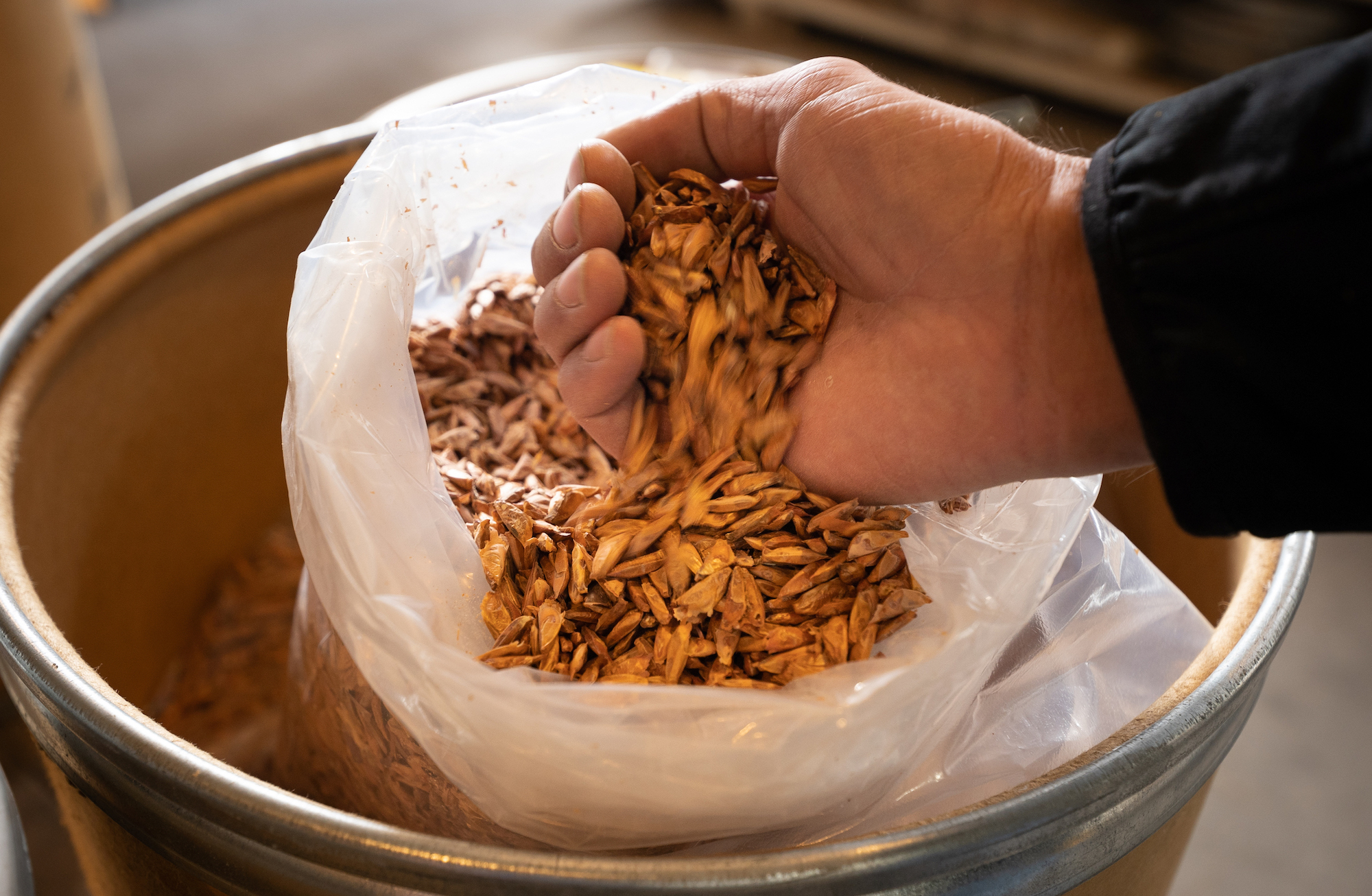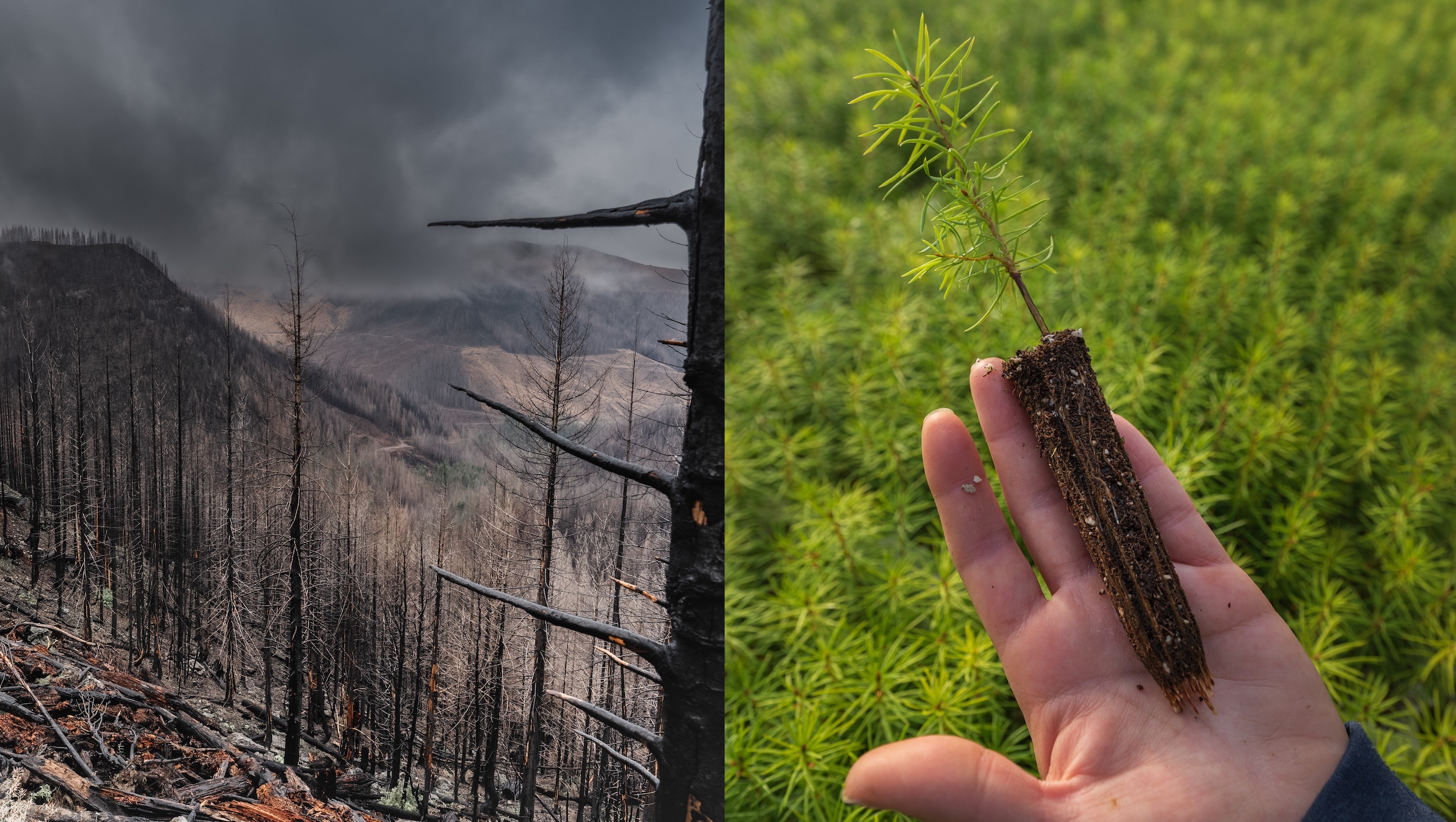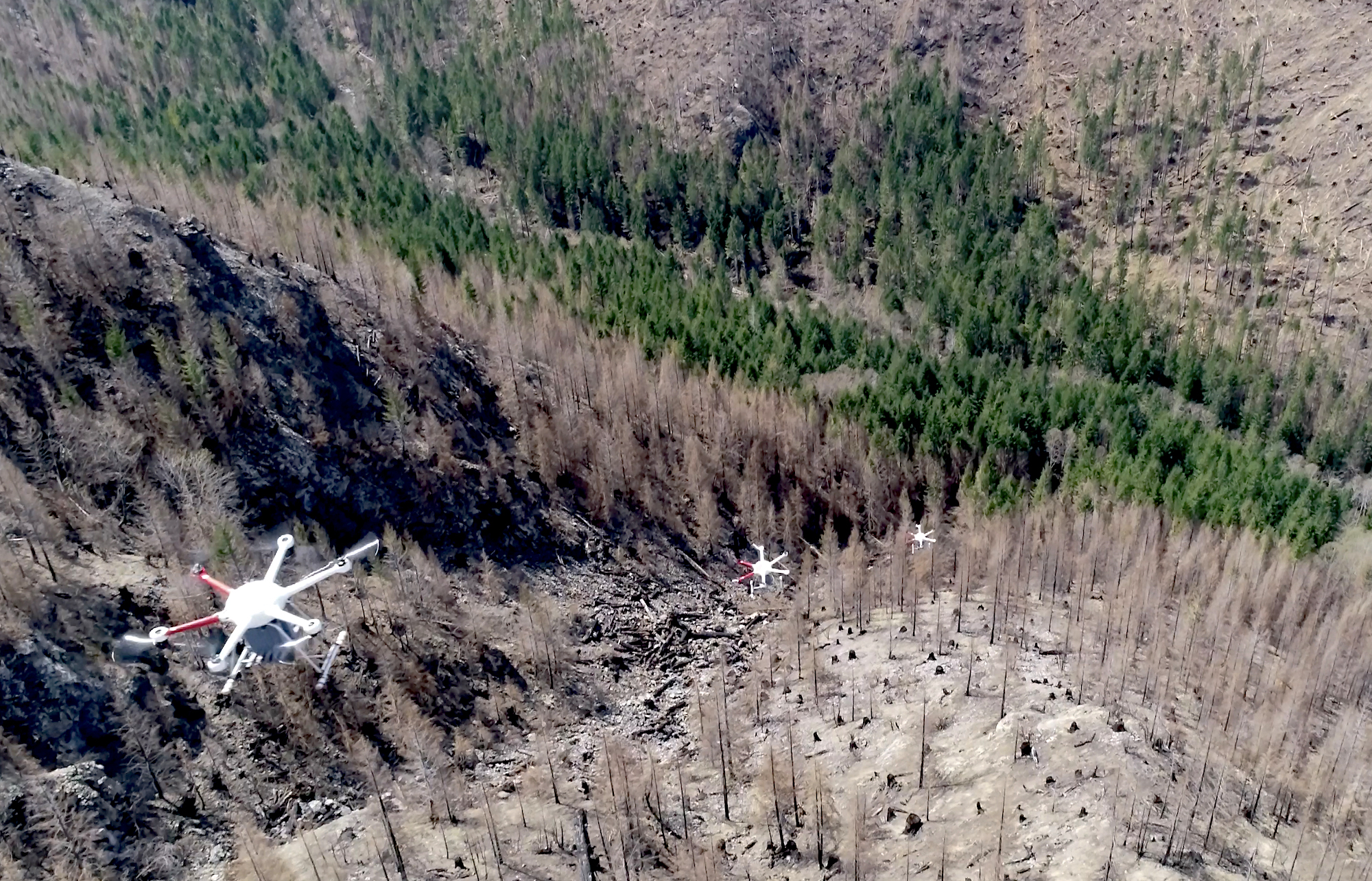Here’s the problem: The planet is burning, and there’s not much we can do about it.
Forests are in peril not just because of the ravages of climate change, but because the industries that support them remain traditional and under-resourced. Mast Reforestation is building a tech-forward forest-as-a-service company that vastly simplifies and accelerates the process of restoring lands lost to wildfires.
The company sprouted, as it were, from DroneSeed, which was pioneering new methods of analyzing forests and planting seeds as a sort of remedial precision agriculture. What they found was that although their methods were effective, the bottleneck to restoring forests wasn’t just the planting process. It was…pretty much everything else.
To plant a tree, you need a seedling (preferably thousands of them); that seedling needs to be grown by someone; that someone needs a seed supply and growing infrastructure, not to mention the logistics to tie it all together. And the companies serving these needs were often a century old or more, relics of the old logging industry that haven’t changed how they work in decades, for lack of either capital or interest.
As wildfires became a regular (and devastating) part of many regions’ dry seasons, suppliers of seedlings were caught flat-footed. Though it’s clearly an increasingly important part of supporting our planet’s health, reforestation has largely been standing still as other industries have raced to embrace technology.
DroneSeed’s $36M A round makes it a one-stop shop for post-wildfire reforestation
The result is satellite imagery that can tell us the exact shape of a fire and machine learning models that can predict its extent, but the seed banks and seedling growers, distribution networks and everything in between operate as if it’s still the 20th century…if not the 19th.
Though that legacy does prove to be important as well as limiting, it was obvious that demand had already exceeded supply by a massive margin. DroneSeed, having innovated on the (equally outdated) processes on the demand side, decided to go all in and build a new company combining the resources and networks of century-old forestry companies with a new generation of tech.
The result is Mast Reforestation — a reference to “mast events” when trees produce a bumper crop of cones and seeds. It acts as the umbrella company for DroneSeed, as well as for the recently acquired seed processor Silvaseed, and other companies and platforms to come. Together they are building a complete solution for reforestation, from sourcing seeds to growing improved seedlings to planting them on site, tracking it all using powerful, accessible tech. Perhaps most importantly, they make the whole thing make sense financially by wrangling the carbon credits and government funding needed to subsidize this crucial industry.
Funding seeds
It turns out that between these disparate pieces is a huge amount of synergy that’s been left on the table for decades. The seed people aren’t seedling people, and the seedling people aren’t foresters, and the foresters aren’t financial experts — each piece could inform the others, but that just hasn’t happened.

This lack of innovation and investment is what DroneSeed discovered when it raised its Series A and bought Silvaseed, one of a handful of large seed providers that together serve the whole country. Dozens of companies and agencies relied on Silvaseed, a 125-year-old company, but few recognized its importance as a bottleneck in the reforestation pipeline until it was too late. DroneSeed (which soon reorganized as Mast) bought it because it saw the potential in its facilities and expertise.
For instance, Silvaseed helped establish the now-industry-standard seed zone chart — turns out seeds from a pine that grows in Washington are not ideal if you’re planting in southern Oregon, even if they’re the same species. For that matter, a pine on the east side of a ridge might grow poorly on the west side of a ridge. These innumerable variations were recognized and formalized by Silvaseed and others early on, but now they can be tracked with astonishing granularity.
As part of its successful effort to triple seed production and availability, Mast has built a system that literally tracks every tree from seed source to planting location and beyond. Collected west of a ridge in southern Oregon, on October 19, planted at this exact GPS coordinate on July 2, and measured at this height and circumference 2 years later. Making a rich data play like this not only provides a powerful dashboard for logistics that can be read by anyone at a glance, but it also enables detailed studies of outcomes and easy identification of opportunities and needs.
As with any other big data system, you improve by half a point here and there, pretty soon you’re saving millions of dollars, or in this case seedlings. Right now the data platform is strictly for “customers, partners, and consulting foresters,” the last of which is a career track I would have pursued had I known it existed.
After the seeds come seedlings, of course, which were another challenge entirely. Until recent years, wildfires were relatively predictable and tended to be adequately repaired through natural processes — a little help here and there at the worst spots was all they needed, and that meant seedling providers generally just grew one big crop per year. Anyone on the supply side will tell you that locking in not just product quantity but also timing is a disaster waiting to happen whenever the market shifts. And boy did it shift!
“Blasted hellscapes”
Seedling providers have been overwhelmed year after year, as wildfires happen more frequently and less predictably. If all your seedlings are best planted within a month of maturity in, say, July, what happens when wildfires start in May? And what if you run out of them before August — just as things get really bad?
This was the situation Mast confronted when it found that, even if it produced ten times the number of seeds, they couldn’t be grown and planted fast enough. It simply wasn’t done.
So in March, they bought Cal Forest, one of the country’s biggest seedling providers: again, a business and category that has failed to attract meaningful innovation or investment over the decades, even as foresters and ecologists raised the alarm.
Now Cal Forest’s operations are being tranformed into a year-round growing operation that brings modern advances to the greenhouses. Not only are today’s precision agriculture techniques like environmental controls being implemented — and a huge new facility they call the Terrafactory is coming to the Seattle area — but forestry experts at Mast are also changing the trees themselves.
No, not through genetic modification — just plain old cultivation of desirable traits. Mast calls its improved seedlings “fireplugs,” after both their shorter, thicker character and the fact that they are more resistant to wildfire and post-fire conditions.

By cultivating a thicker stem and deeper root system, the chances of any seedling’s survival in these harsh conditions are raised considerably. Although you might think that wide-open skies and freshly cleared land make for a paradise for saplings, in fact “these are blasted hellscapes,” said Mast’s VP of R&D, Matthew Aghai. Any advantage you can give a sapling against invasive plants, heat and exposure, water scarcity and other issues translates directly to improved survivability.
Combined with the seed zone tracking and improved cadence, this means more seedlings are available at any given time and more that are planted will survive, and importantly this can all be verified and recorded. That last bit is important because it helps the work and because the financing of this work is yet another obstacle to quick and effective reforestation.
Carbon credits as working capital
The basic economic equation is this: The value of forests is often achieved when they are harvested, but its value can also be measured in how much carbon they sequester, how they prevent erosion, and benefits of varying tangibility. Unfortunately, most of these factors take place over a period of decades — making investments inherently a long-term proposition.
Now, if you’re a land owner or manager and your forest burns, you may no longer have the value of that forest, and possibly you won’t even have anything of value to borrow against in order to replant it. This situation has become increasingly common, and although grants and other financial instruments can be brought in, it’s far from simple. If I asked you for a few million bucks to plant some trees worth nothing until 2040, and that may well burn again in the next ten years…well, I wouldn’t blame you if you held on to your money.
The solution being embraced by Mast is carbon credits — but here we must make sure to discriminate between two frequently confused concepts. Carbon offsets are often used to greenwash a business, paying some cash to a middleman who says they’ll eventually put that money into another company, that may in the future do some project that may eventually sequester some carbon. The term and practice have justifiably attracted considerable skepticism, but the idea is sound — you just have to do a little more than make green-tinged promises.
And we need to make it work, because right now it’s the only way to finance a project like a major reforestation effort on short notice.
Because it isn’t cheap or easy. If you’re a land owner and your timber goes up in flames, you’re looking at weeks of calls and paperwork to line up the seeds, seedlings, grants, loans, loggers, planters, insurance, and everything else; you’d be lucky if the chainsaws are roaring within a couple months. Mast’s ambition is that you will make one call and there will be seedlings in the ground before invasive or undesirable species (and there are plenty) have time to put down their own roots.

The carbon credit system Mast works with is overseen by various industry authorities and is a per-project first-party deal: You buy $5 million worth of carbon credits, and that money goes to directly plant, as well as inspect and insure an equivalent carbon value of trees in a long-term management process.
Lest you think this is all a lot of pleasant hypotheticals, the company has raised $15 million in project financing for its upcoming planned reforestation work, primarily Sheep Creek Ranch near Yellowstone.
It’s made possible by the data Mast collects. They’re not out here claiming future projects with an estimated tree count — if you bought the credits, you can see exactly where they went, down to about one square meter. Not only that, but you can also be sure you know where the seeds and seedlings came from and that the location will regularly be visited and checked by independent evaluators, whose reports feed back into the data stream. The company also makes sure to include some aspect of research in every project, since this data is so valuable to itself and to forest managers worldwide.
Mast unifies these separate parts that have languished by themselves — by connecting the pieces, each becomes stronger and informs the other. With wildfire season in the U.S. rapidly approaching, the next few months and year will be the first the company experiences in its new form — too early to bring some of its innovations to bear (they do, after all, have to grow first), but nevertheless it is an opportunity to nurture a better future for reforestation.































Comment